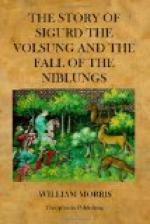So now, when all things were
ready, in the first of the autumn tide
Adown unto the swan-bath the
Volsung Children ride;
And lightly go a shipboard,
a goodly company,
Though the tale thereof be
scanty and their ships no more than three:
But kings’ sons dealt
with the sail-sheets and earls and dukes of war
Were the halers of the hawsers
and the tuggers at the oar.
So they drew the bridges shipward,
and left the land behind,
And fair astern of the longships
sprang up a following wind;
So swift o’er AEgir’s
acre those mighty sailors ran,
And speedier than all other
ploughed down the furrows wan.
And they came to the land
of the Goth-folk on the even of a day;
And lo by the inmost skerry
a skiff with a sail of grey
That as they neared the foreshore
ran Volsung’s ship aboard,
And there was come white-hand
Signy with her latest warning word.
“O strange,” she
said, “meseemeth, O sweet, your gear to see,
And the well-loved Volsung
faces, and the hands that cherished me.
But short is the time that
is left me for the work I have to win,
Though nought it be but the
speaking of a word ere the worst begin.
For that which I spake aforetime,
the seed of a boding drear,
It hath sprung, it hath blossomed
and born rank harvest of the spear;
Siggeir hath dight the death-snare;
he hath spread the shielded net.
But ye come ere the hour appointed,
and he looks not to meet you yet.
Now blest be the wind that
wafted your sails here over-soon,
For thus have I won me seaward
’twixt the twilight and the moon,
To pray you for all the world’s
sake turn back from the murderous
shore.
—Ah take me hence,
my father, to see my land once more!”
Then sweetly Volsung kissed
her: “Woe am I for thy sake,
But earth the word hath hearkened,
that yet unborn I spake;
How I ne’er would turn
me backward from the sword or the fire of bale;
—I have held that
word till today, and today shall I change the tale?
And look on these thy brethren,
how goodly and great are they,
Wouldst thou have the maidens
mock them, when this pain hath past away
And they sit at the feast
hereafter, that they feared the deadly
stroke?
Let us do our day’s
work deftly for the praise and the glory of folk;
And if the Norns will have
it that the Volsung kin shall fail,
Yet I know of the deed that
dies not, and the name that shall ever
avail.”
But she wept as one sick-hearted:
“Woe’s me for the hope of the morn!
Yet send me not back unto
Siggeir and the evil days and the scorn:
Let me bide the death as ye
bide it, and let a woman feel
That hope of the death of
battle and the rest of the foeman’s steel.”




